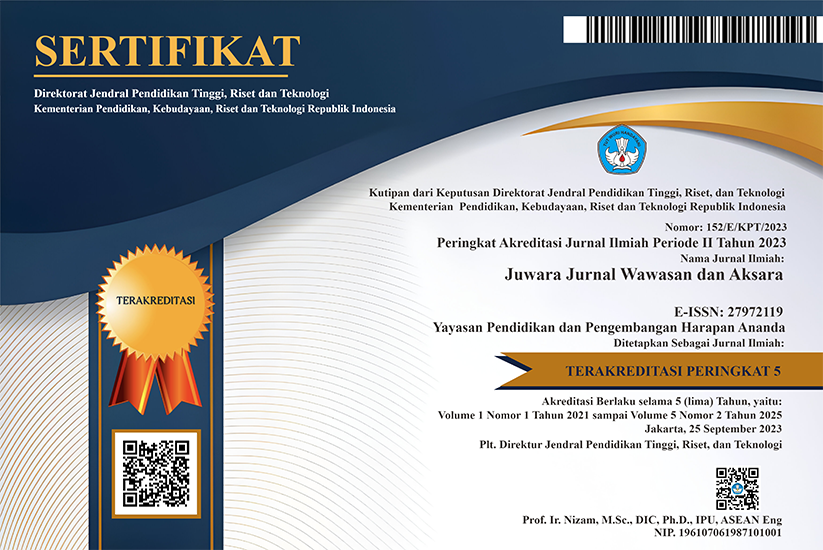Student Perceptions of the Use of Interactive Digital Media in Improving Learning Motivation
DOI:
https://doi.org/10.58740/juwara.v5i1.313Keywords:
interactive digital media, learning motivation, student perceptionAbstract
This study aims to explore students' perceptions of the use of interactive digital media and its influence on learning motivation. Interactive digital media is expected to increase students' engagement in learning and motivate them to be more active in the learning process. This research uses a descriptive qualitative approach with data collection techniques through semi-structured interviews and observation. The sample used was 5-10 students selected as key informants in one junior high school. The data were analyzed using thematic analysis techniques which included data reduction, categorization, and meaning of emerging themes. The results show that students have a positive view of the use of interactive digital media in learning, which they feel can increase their motivation to learn. Based on these findings, it is recommended to utilize interactive digital media as an effective tool in the learning process to increase students' motivation and engagement. The implication of this study shows that the integration of interactive digital media in the learning curriculum can be an innovative strategy to create a more engaging learning environment, encourage student-centered learning, as well as support the development of 21st century skills such as critical thinking, collaboration, and digital literacy.
References
Ayeni, A., Bisschoff, C., Sekhampu, J., Lekunze, J., & Ayeni, E. (2024). Interactive Marketing: A Systematic Review and Research Agenda. F1000Research. https://doi.org/10.12688/f1000research.156743.1
Budiman, R. D. A., Surjono, H. D., Wagiran, Maulana, Hidayat, E., & Syafruddin. (2025). Gamification: Enhancing Constructivist Skills through Line-Following Robots. International Journal of Online and Biomedical Engineering (iJOE), 21(01), pp. 132–150. https://doi.org/10.3991/ijoe.v21i01.51727
Cornwall, A. (2024). Question cards: Putting your cards on the table in the interview process. Qualitative Research. https://doi.org/10.1177/14687941241277749
Creswell, J. W. (2014). Research design: Qualitative, quantitative, and mixed methods approaches. Sage Publications.
Dunn, J., & Zimmer, C. (2020). Self-determination theory. Routledge Handbook of Adapted Physical Education. https://doi.org/10.4324/9780429052675-23
Duterte, J. (2024). Effective Pedagogical Strategies for Digital Learners. Epra International Journal of Research & Development (IJRD). https://doi.org/10.36713/epra18211
Fadli, M. (2021). Memahami desain metode penelitian kualitatif. HUMANIKA, 21, 33-54. https://doi.org/10.21831/HUM.V21I1.38075.
Fahada, N., & Asrul, N. (2024). Students Perception of Gamified Learning in EFL Class Online Quizizz for Engagement and Motivation. Journal Of Education And Teaching Learning (JETL). https://doi.org/10.51178/jetl.v6i2.1828
Hevko, I., Siaonan, S., & Wu, H. (2023). Innovative interactive technologies in the training of professional education specialists by means of digital technologies. Journal of Education, Health and Sport. https://doi.org/10.12775/jehs.2023.37.01.013
Hidayati, I. D., & Aslam, A. (2021). Efektivitas Media Pembelajaran Aplikasi Quizizz Secara Daring Terhadap Perkembangan Kognitif Siswa. Jurnal Pedagogi Dan Pembelajaran, 4(2), 251–257. https://doi.org/10.23887/jp2.v4i2.37038
Howard, J., Bureau, J., Guay, F., Chong, J., & Ryan, R. (2021). Student Motivation and Associated Outcomes: A Meta-Analysis From Self Determination Theory. Perspectives on Psychological Science, 16, 1300 - 1323. https://doi.org/10.1177/1745691620966789
Hu, B., Malik, I., Noman, S., & Irshad, M. (2023). Enhancing sustainability in web design: a comparative exploration of multimedia systems and technology management, 12804, 128041X - 128041X-6. https://doi.org/10.1117/12.3005431
Katona, B., Venkataragavan, J., Nina, E., Ulrika, B., & Björn, O. (2023). Use of Visual Learning Media to Increase Student Learning Motivation. World Psychology. https://doi.org/10.55849/wp.v1i3.381
Kunz, T., Daikeler, J., & Ackermann-Piek, D. (2023). Interviewer-Observed Paradata in Mixed-Mode and Innovative Data Collection. International Journal of Market Research, 66, 14 - 26. https://doi.org/10.1177/14707853231184742
Kurniawati, D., Rasuki, M., & N. (2024). Exploring Student Perceptions of Quizizz for TOEFL Reading Practice. Scripta: English Department Journal. https://doi.org/10.37729/scripta.v11i1.5170
Manesis, D. (2020). Digital Games in Primary Education. Game Design and Intelligent Interaction. https://doi.org/10.5772/intechopen.91134
Mayer, R. (2024). The Past, Present, and Future of the Cognitive Theory of Multimedia Learning. Educational Psychology Review. https://doi.org/10.1007/s10648-023-09842-1
Moleong, L. J. (2017). Metodologi penelitian kualitatif. PT Remaja Rosdakarya.
Mouna, K., Lakrami, F., & Labouidya, O. (2023). Design of An Adaptive E-learning Model Based on Artificial Intelligence for Enhancing Online Teaching. Int. J. Emerg. Technol. Learn., 18, 202-219. https://doi.org/10.3991/ijet.v18i06.35839
Rahman, A. (2020). Gamified learning using Quizizz: An empirical study on student motivation. International Journal of Interactive Mobile Technologies, 14(15), 109–121. https://doi.org/10.3991/ijim.v14i15.14661
Rakaj, D. (2025). EFL Students’ Perceptions of Using Quizizz as a Learning Tool. Theory and Practice in Language Studies. https://doi.org/10.17507/tpls.1502.01
Rivera, E., & Garden, C. (2021). Gamification for student engagement: a framework. Journal of Further and Higher Education, 45, 999 - 1012. https://doi.org/10.1080/0309877X.2021.1875201
Ryan, R., Deci, E., Vansteenkiste, M., & Soenens, B. (2021). Building a science of motivated persons: Self-determination theory’s empirical approach to human experience and the regulation of behavior.. Motivation Science. https://doi.org/10.1037/mot0000194
Safitri, D., Awalia, S., Sekaringtyas, T., Nuraini, S., Lestari, I., Suntari, Y., Marini, A., Iskandar, R., & Sudrajat, A. (2022). Improvement of Student Learning Motivation through Word-Wall-based Digital Game Media. Int. J. Interact. Mob. Technol., 16, 188-205. https://doi.org/10.3991/ijim.v16i06.25729
Smiderle, R., Rigo, S., Marques, L., De Miranda Coelho, J., & Jaques, P. (2020). The impact of gamification on students’ learning, engagement and behavior based on their personality traits. Smart Learning Environments, 7. https://doi.org/10.1186/s40561-019-0098-x
Sugiyono. (2019). Metode penelitian kuantitatif, kualitatif, dan R&D. Alfabeta.
Supriyatin, T. (2024). Persepsi Siswa Terhadap Penggunaan Quizizz dalam Pembelajaran Matematika. Journal of Nusantara Education, 3(2), 19–29. https://doi.org/10.57176/jn.v3i2.88
Suwarni, S., Lubna, L., Aimang, H., Cakranegara, P., & Pratama, D. (2023). Quizizz Gamification of Student Learning Attention and Motivation. AL-ISHLAH: Jurnal Pendidikan. https://doi.org/10.35445/alishlah.v15i2.3215
Tanjung, M. M., Nopitasari, L., Susanti, H., & Walid, A. (2023). Efektivitas Penggunaan Quizizz Untuk Meningkatkan Motivasi Dan Hasil Belajar Kognitif Pada Mata Pelajaran IPA di SMPN 18 Kota Bengkulu. Jurnal Pendidikan Dan Konseling (JPDK), 5(1), 4368–4371. https://doi.org/10.31004/jpdk.v5i1.11414
Tazhenova, G., Mikhaylova, N., & Turgunbayeva, B. (2024). Digital media in informal learning activities. Educ. Inf. Technol., 29, 21673-21690. https://doi.org/10.1007/s10639-024-12687-y
Yani, Y., Vidya, R., Tiirtheshvara, D., Dantes, G., & Indrawan, G. (2024). The Impact of the Quizizz Application on Students' Self-Efficacy. Jurnal Penelitian Pendidikan IPA. https://doi.org/10.29303/jppipa.v10i12.9456
Yanuarto, W., & Hastinasyah, P. (2023). Gamification: Quizizz in Mathematical Game Learning for Secondary Students. Indonesian Journal of Mathematics Education. https://doi.org/10.31002/ijome.v5i2.6588
Yunus, C., & Hua, T. (2021). Exploring a Gamified Learning Tool in the ESL Classroom: The Case of Quizizz. Journal of Education and e-Learning Research. https://doi.org/10.20448/JOURNAL.509.2021.81.103.108
Downloads
Published
How to Cite
Issue
Section
License
Copyright (c) 2025 Raynaldi Nugraha Prasetya, Ridho Dedy Arief Budiman, Aura Astuti, Devi Anggi Friani, Suharti Siradjuddin

This work is licensed under a Creative Commons Attribution-NonCommercial 4.0 International License.
JUWARA: Jurnal Wawasan dan Aksara provides open access to anyone so that the information and findings in these articles are useful for everyone. This journal's article content can be accessed and downloaded for free, following the creative commons license used.




















